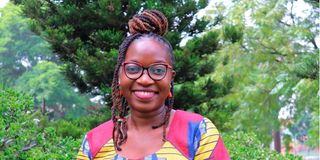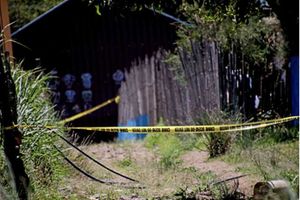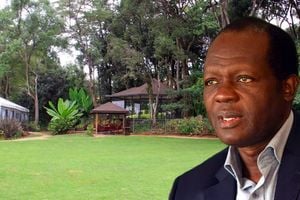Making of an expert in molecular medicine and virology

Dr Luicer Olubayo, a PhD spearheader in science.
Dr Luicer Ingasia Olubayo's path to becoming a spearhead in science was shaped by her upbringing in a family steeped in STEM disciplines. The daughter of an automotive engineer and a nurse, her early exposure to science ignited a passion that would lead her to make notable strides in the fields of molecular medicine and virology.
When she talks of her journey, she mentions grants and scholarships, which provided the financial resources that allowed her extensive study in her research endeavors.
She talks about overcoming personal and professional challenges and contributing to groundbreaking research.
Your journey in science began early in your life. How did your family influence your passion for STEM?
I have been passionate about science, technology, engineering, and mathematics for years because of my family’s influence, being brought up in an environment where what you constantly hear is science or medicine being talked about. My father was an automotive engineer, my mother a nurse. I was less inclined to shift my mind to other fields.
You initially aspired to become a medical doctor, what changed?
My initial dream was to be a medical doctor, but considering that I did not attain the required clusters, I decided to take a related course in the field. I did medical laboratory science at Jomo Kenyatta University. However, an incident during my training got me to move into research in health. I was in a hospital, and while I was taking a patient’s blood sugar at the outpatient department, I accidentally pricked myself after pricking the patient. I could see blood coming out of my glove. Since then, I did not think a clinical setting was where my heart was. I decided to move into research, and that was one way to contribute to science by generating evidence-based policy recommendations that would still benefit clinical settings.
I applied for my Master's in Molecular Medicine; my interest was in malaria at the time, which was in the community's interest. During her Master’s project, she worked with the US Army Medical Research Directorate Africa (USAMRD-A) in partnership with KEMRI-CGHR, tracking chloroquine resistance over time after the introduction of Artemether-Lumefantrine in Kenya.
What drove you to concentrate on this particular disease?
Malaria was not just a research interest; it was a personal mission. Growing up in Western Kenya, where malaria is prevalent, I saw first-hand how it affected my community. My desire to contribute to public health, coupled with my academic interests, drove me to focus on tracking antimalarial drug resistance. I wanted to be part of the solution, to disseminate crucial findings to policymakers and ultimately help in the fight against malaria.
Pursuing a PhD is a significant undertaking, especially in a field like molecular virology…
My ambition has always been to lead a research unit one day. To do that, I knew I needed to position myself competitively, gaining the experience, networks, and qualifications necessary. During my PhD at the University of Witwatersrand, I majored in molecular virology, which allowed me to delve deeper into research areas that aligned with my passions. It was a chance to grow beyond my comfort zone and prepare myself for the kind of research that can make a meaningful impact on public health.
Your PhD journey was not without challenges, you say.
The Covid-19 pandemic posed some major challenges, especially when I had to halt my experiments temporarily. Balancing my PhD with motherhood added another layer of complexity. But what kept me going was the incredible support system around me. My mentors and family played a crucial role in helping me stay focused and complete my PhD. Despite the obstacles, I managed to finish in what some would call record time, and that is something I am very proud of.

Your research has also ventured into human genetics and the intersection of infectious and non-communicable diseases. What sparked your interest in these areas?
My curiosity about the human host and why some people are more susceptible to infections than others led me to explore human genetics. With a postdoctoral fellowship at Wits University and the University of Edinburgh, I began studying genome variations and their impact on disease susceptibility. I also wanted to understand how lifestyle changes in sub-Saharan Africa have led to the rise of non-communicable diseases like hypertension and diabetes, along with infectious diseases. It is an intersection that I find both fascinating and critical to public health.
One of your significant contributions was during the Covid-19 pandemic, where you helped identify the Omicron variant. What was the experience like?
Being part of the South African Next Generation Sequencing Group during the pandemic was one of the most impactful experiences of my career. Through genomic initiatives, we identified the SARS-CoV-2 Omicron variant in South Africa. This initiative generated valuable insights into the rapidly spreading strain of the virus. In harnessing the power of the human gut microbiome, research has shown a strong link between gut microbes and the health of our immune system, heart, and brain.
In collaboration with scientists from Stanford University, I am currently part of the AWI-Gen 2 Microbiome Project, which seeks to understand how genetics, geography, and lifestyle shape the microbiome and influence our health in an understudied African population. Apart from filling an important research gap, we seek to put the African Gut Microbiome on the map.
Your work has won prestigious awards and fellowships.
Yes! The funding sources have been a key shift in my career. Without being awarded that opportunity by the OWSD (Organisation of Women in Science for the Developing World), as well as L'Oréal UNESCO, to pursue my PhD, I would not have spread my wings out of the border of Kenya to take up the fellowship. I was also included in the Young and Upcoming Women in Science Award from L'Oréal UNESCO, OWSD Ph.D. fellowship, and a prestigious postdoctoral fellowship at Wits and co-hosted by the University of Edinburgh.
What has been your motivation?
My motivation comes from the pressing need to address diseases of public health concern and improve human health. It is from all the research findings, that evidence-based policy recommendations for various diseases are generated. At the end of the day, we have a question in mind that we need to address to help the underprivileged. ‘Life is like a puzzle, we all are tiny puzzle pieces that come together to collaborate and make life meaningful.’ Similarly, scientists collaborate, and for me, adding that one puzzle to that board is what I'm passionate about.
Beyond your research, you’re also passionate about mentoring the next generation of scientists. Why is this important to you?
I want my journey to inspire someone else to say, they would also want to be in a better position and mentor the young ones the way I was mentored.
I also believe that by mentoring young scientists, especially women, we can inspire the next generation to pursue careers in STEM and make a difference. It is not just about providing guidance, it is about being a role model and helping others navigate the challenges of balancing career and family, especially in fields that are still male-dominated.
What advice would you give to young women aspiring to enter the field of science?
My advice is simple, don’t give up. If it's close to your heart, you'll give it your all. Don’t be influenced by other people’s choices, chart your path based on your abilities. Do not be defined by your current situation, remember, diamonds don’t start polished and shining because, once upon a time, they were nothing special until they went through some pressure over time to become spectacular.
What do you envision for the role of technology and funding in advancing health research in Africa?
You can't beat technology, we have to embrace it. With technological advancements, we can better diagnose and treat diseases. But we also need our governments to invest in research that matters to us. Honestly, Africa is rich in resources. But when we wait for a donor to bring in funds, they will come with their presences that you have to abide by, so we are not able to have the flexibility to address very specific African health-related problems.




